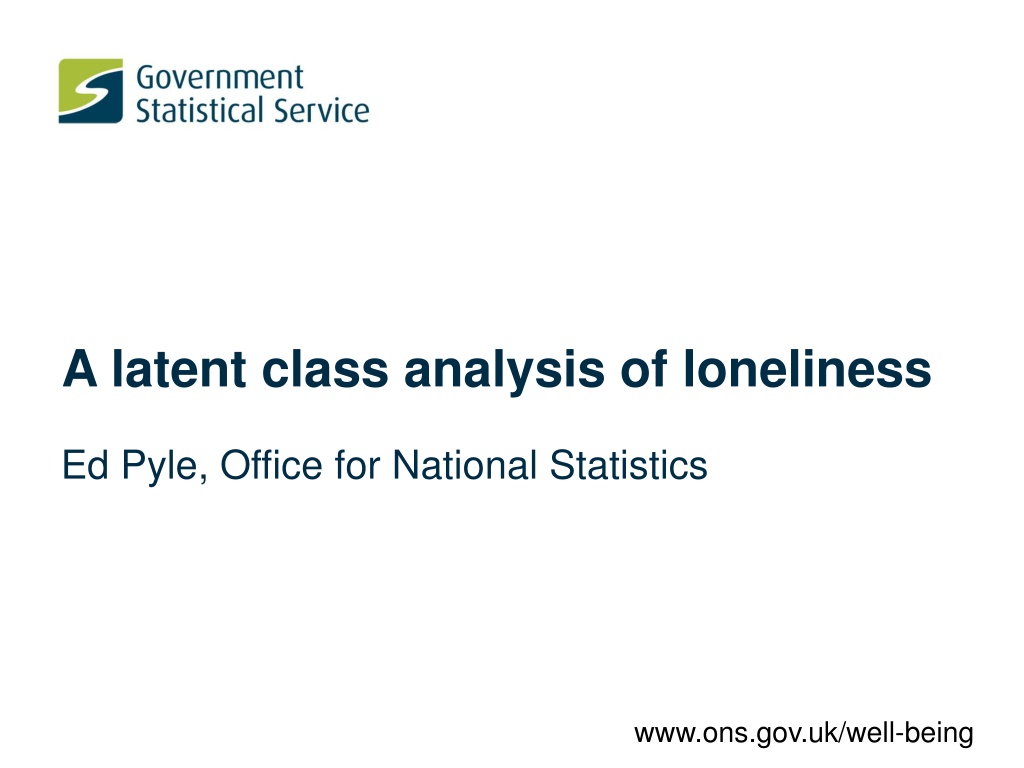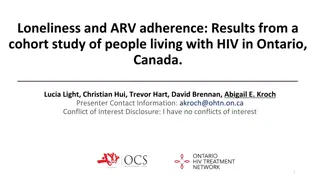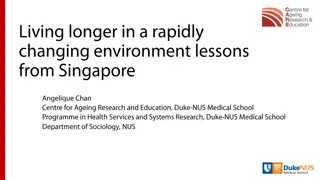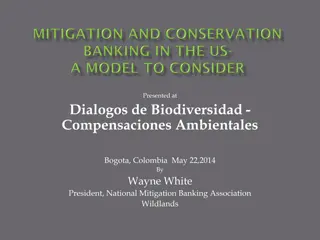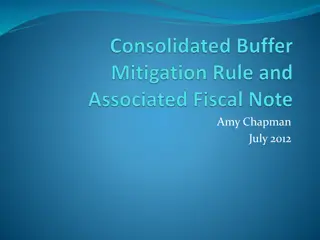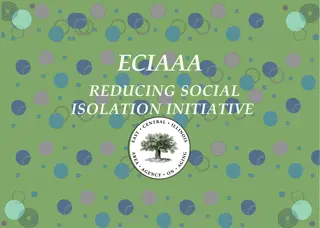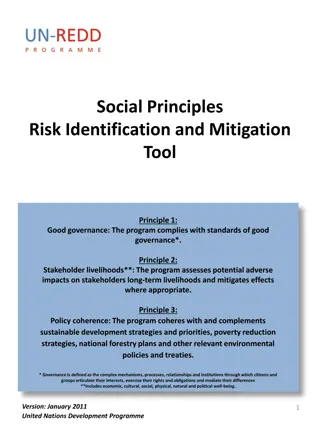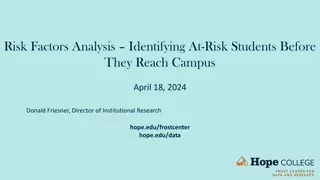Understanding Loneliness: Impact, Risk Factors, and Mitigation Strategies
Loneliness is a prevalent issue affecting various age groups, with young people particularly at risk. It is linked to negative health outcomes and societal implications. The Office for National Statistics (ONS) conducted a study highlighting groups vulnerable to loneliness, such as widowed older homeowners and young renters. Utilizing Latent Class Analysis (LCA), researchers aim to classify individuals based on shared characteristics to develop targeted interventions. Efforts are underway to address loneliness on a national level, emphasizing the importance of social connections for overall well-being.
Uploaded on Sep 23, 2024 | 0 Views
Download Presentation

Please find below an Image/Link to download the presentation.
The content on the website is provided AS IS for your information and personal use only. It may not be sold, licensed, or shared on other websites without obtaining consent from the author. Download presentation by click this link. If you encounter any issues during the download, it is possible that the publisher has removed the file from their server.
E N D
Presentation Transcript
A latent class analysis of loneliness Ed Pyle, Office for National Statistics www.ons.gov.uk/well-being
Loneliness - What characteristics and circumstances are associated with feeling lonely? (April 2018) Groups found to be at risk of loneliness: Widowed older homeowners living alone with long-term health conditions Unmarried, middle-agers, with long-term health conditions Younger renters with little trust and sense of belonging to their area
Loneliness more likely to affect young people Loneliness on its way to becoming Britain s most lethal condition Britain's 16 to 24-year-olds are the loneliest generation after building their lives around social media Lonely 'Generation Rent' do not feel part of their communities, ONS finds Loneliness linked to major life setbacks for millennials, study says Bring back youth clubs to help lonely millennials, experts say Young renters are battling loneliness
Loneliness Loneliness is a subjective experience that often occurs with mismatch between the social relationships that we have, and those that we want. 5% of adults in England report feeling lonely often or always" (ONS, 2018). Impact Unpleasant experience which contributes to unhappiness. Damaging to health and wellbeing. Found to be associated with: cardiovascular disease and infection Mental health issues including depression Shorter lifespans People with certain characteristics and life circumstances are at greater risk than others.
Project context Late 2017 The Jo Cox Commission on Loneliness published a series of recommendations January 2018 Prime Minister announced: Ministerial lead for loneliness (DCMS) Development of a strategy to alleviate loneliness ONS is currently working with DCMS to develop national measures of loneliness. April 2018 ONS publication presented findings based on existing survey data.
What is Latent Class Analysis (LCA)? form of cluster analysis that uses categorical data (rather than continuous data e.g. factor analysis). can be used to classify individuals into groups depending on their responses to survey questions. Widely used in market research for segmentation analysis to identify consumer subgroups. We used LCA to separate our sample into groups of people who share combinations of characteristics so that they are similar to each other but different from those of other groups. Why did we use LCA? Population estimates mask differences between subgroups Though often we isolate factors when examining relationships between variables, in practice combinations of factors go together
The data Community Life Survey, 2016-2017 Household survey Self-completion online (some postal) 10,256 cases Adults (16+) England only Loneliness question (and variable of interest) How often do you feel lonely? Often/always Some of the time Occasionally Hardly ever Never 10,057 responses to loneliness question
Data preparation 1. Select independent variables - Review existing loneliness research - Explore variables in dataset - Crosstab with loneliness variable. Collapse categories to address small cell counts where reasonable. 2. Recode a binary version of loneliness How often do you feel lonely? More often (Often/always, some of the time, occasionally) Less often (Hardly ever, never) 3. Logistic regression
Building the LCA model Final clustering variables: Loneliness Marital status General health Housing tenure Long-term health condition Lives alone/does not live alone Age Group Missing data LCA can only be applied to cases where there is complete data for all variables included in the model. Only 6,149 of the 10,057 respondents who answered the loneliness question were included in the LCA analysis due to missing data.
Selecting variables for good separation Model A - Poorer separation How strongly do you belong to Britain (%) Lonely (%) Formal Qualifications (%) Not very strongly Not at all strongly No qualifications More often Less often Strongly 45.3 51.8 Qualifications Class 1 Class 2 54.7 48.2 30.3 35.6 36.7 32.7 33.1 31.7 49.6 48.2 50.4 51.8 Model B - Better separation Lonely (%) General health (%) Age Group (%) More often Less often Good Fair Bad 16-34 35-64 65+ Class 1 10.7 89.3 95.7 4.3 0 72.7 14.2 13 Class 2 75.7 24.3 2.3 6.9 90.9 6.2 10.4 83.5
Selecting the optimal number of classes Bayes Information Criterion (BIC) 62000 Classes BIC 1 60,013.12 60000 2 57,058.24 58000 3 55,265.58 56000 4 54,367.77 5 53,991.97 54000 6 53,708.09 52000 7 53,609.42 50000 8 53617.31 1 2 3 4 5 6 7 8 Classes
Additional descriptive variables Sex In paid employment? Living as a couple? Economic status Long-term limiting health condition? Neighbourhood strength of belonging Trust in others living in neighbourhood Index of Multiple Deprivation
Classes HOW OFTEN LONELY (%) More often Less often 19 31 30 43 43 62 85 81 69 61 57 57 38 15 A B C D E F G
Key findings lonely groups 1. Widowed homeowners living alone with long-term health conditions (Class A) 69% lonely more often (compared with 46% of LCA sample overall). widowed homeowners living alone aged 65 years or older in worse general health have a long-term limiting physical or mental health condition economically inactive (likely to be retired) better-off financially. (Homeowners; 62% of this group live in the 50% least deprived areas)
Key findings lonely groups 2. Unmarried, middle-agers, with long-term health conditions (Class D) 81% lonely more often Single (never married) Aged 35-64 years Live alone Renting Fair-very bad general health Long-term limiting physical or mental health condition More likely to be unemployed or economically inactive likely to live in more deprived areas
Key findings lonely groups 3. Younger renters with little trust in others and sense of belonging to their area(Class E) 61% lonely more often aged 16 to 34 years renting single, separated or divorced living with others good health in paid work likely to live in more deprived areas Over half (55%) reported belonging to their neighbourhood not very strongly or not at all (38% in the LCA sample overall) less trust of others; only 25% reported feeling that many living in their neighbourhood can be trusted (45% of LCA sample overall)
Key findings least lonely group Married homeowners in good health (Class C) 15% lonely more often (compared with 46% of LCA sample overall). living with a partner in a marriage or civil partnership better general health own their home 35+ years (though skewed more towards 65+) 79% reported that they felt they belong to their neighbourhood very or fairly strongly 15% were in employment and 85% were economically inactive (many retired). None unemployed.
Policy contribution Highlights that loneliness is not just an older person issue people of all ages can experience loneliness Published to coincide with ministerial visits to loneliness charities Findings now being used as key evidence in shaping the direction of loneliness strategy for England Being used to frame the current call for evidence on approach to the loneliness strategy closes Friday.
Further information and future work Article and technical report available from ONS website: Loneliness - What characteristics and circumstances are associated with feeling lonely? Recent publication: Understanding well-being inequalities: Who has the poorest personal well-being? (July 2018) Forthcoming loneliness work: Loneliness measure recommendation Children s loneliness Young people s loneliness
Thank you! Questions? Edward.Pyle@ons.gov.uk QualityOfLife@ons.gov.uk
